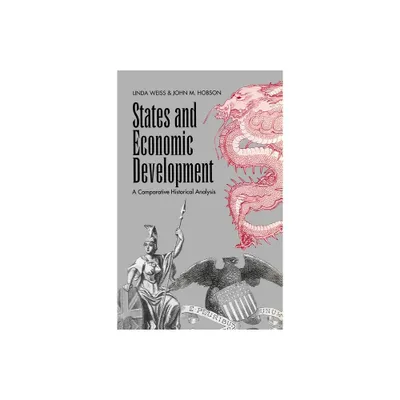Home
Why States Matter Economic Development: The Socioeconomic Origins of Strong Institutions
Loading Inventory...
Barnes and Noble
Why States Matter Economic Development: The Socioeconomic Origins of Strong Institutions
Current price: $180.00


Barnes and Noble
Why States Matter Economic Development: The Socioeconomic Origins of Strong Institutions
Current price: $180.00
Loading Inventory...
Size: Hardcover
*Product Information may vary - to confirm product availability, pricing, and additional information please contact Barnes and Noble
This book examines the underlying conditions that give rise to states that are effective, efficient, and bureaucratically inclusive with their developmental policies.
In spite of humanity’s significant advancements in science, technology and institutionalization of universal human rights conventions in the last seven decades, many countries are still failing to achieve successful development results. As a result, enormous levels of inequality, poverty, and malnutrition prevail. This book focuses on the role of the state in the political economy of development, tracing the socio-economic origins of effective state institutions from a comparative historical-institutional perspective. Drawing on the case studies of South Korea, Brazil, India, Spain, France, and England, the study looks at how good state institutions form, and why these are central to the socioeconomic advancement of their populations. The book contends that effective developmental states are those in which state actors are able to effectively diminish and co-opt the power of the country’s landed elites during the early years of state building. Effectively, the power balance between these two classes determines the developmental trajectory of the state. Considering agrarian reform as the foremost indispensable policy tool to open conditions for positive changes in effective taxation, education, healthcare, and strategic sustainable industrial policies, this analysis offers a significant contribution to the literature on the sociology of institutions and the political economy of development.
As well as being a key reading for advanced students and researchers in these areas, this book draws real-life policy lessons for practitioners and policy makers in the developing world.
In spite of humanity’s significant advancements in science, technology and institutionalization of universal human rights conventions in the last seven decades, many countries are still failing to achieve successful development results. As a result, enormous levels of inequality, poverty, and malnutrition prevail. This book focuses on the role of the state in the political economy of development, tracing the socio-economic origins of effective state institutions from a comparative historical-institutional perspective. Drawing on the case studies of South Korea, Brazil, India, Spain, France, and England, the study looks at how good state institutions form, and why these are central to the socioeconomic advancement of their populations. The book contends that effective developmental states are those in which state actors are able to effectively diminish and co-opt the power of the country’s landed elites during the early years of state building. Effectively, the power balance between these two classes determines the developmental trajectory of the state. Considering agrarian reform as the foremost indispensable policy tool to open conditions for positive changes in effective taxation, education, healthcare, and strategic sustainable industrial policies, this analysis offers a significant contribution to the literature on the sociology of institutions and the political economy of development.
As well as being a key reading for advanced students and researchers in these areas, this book draws real-life policy lessons for practitioners and policy makers in the developing world.


















